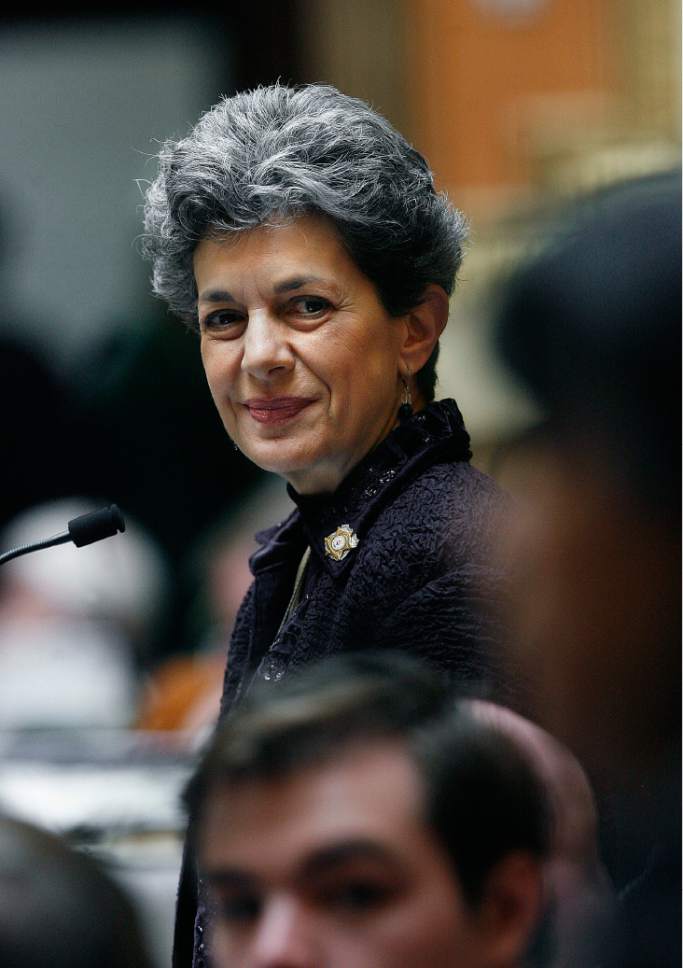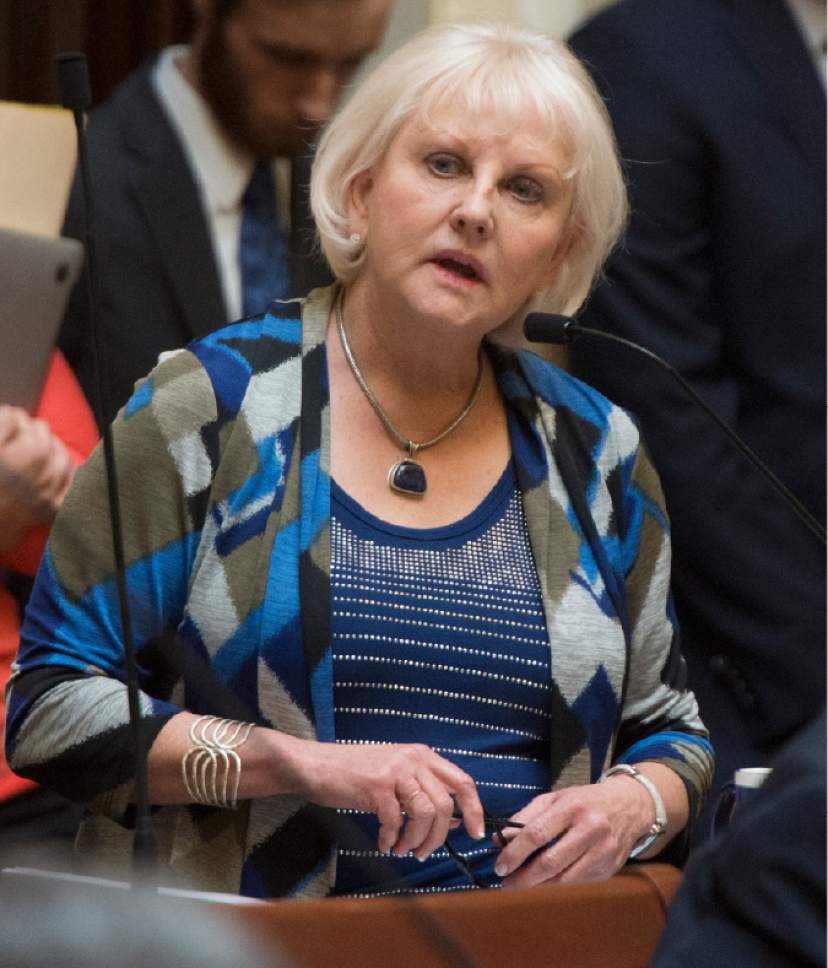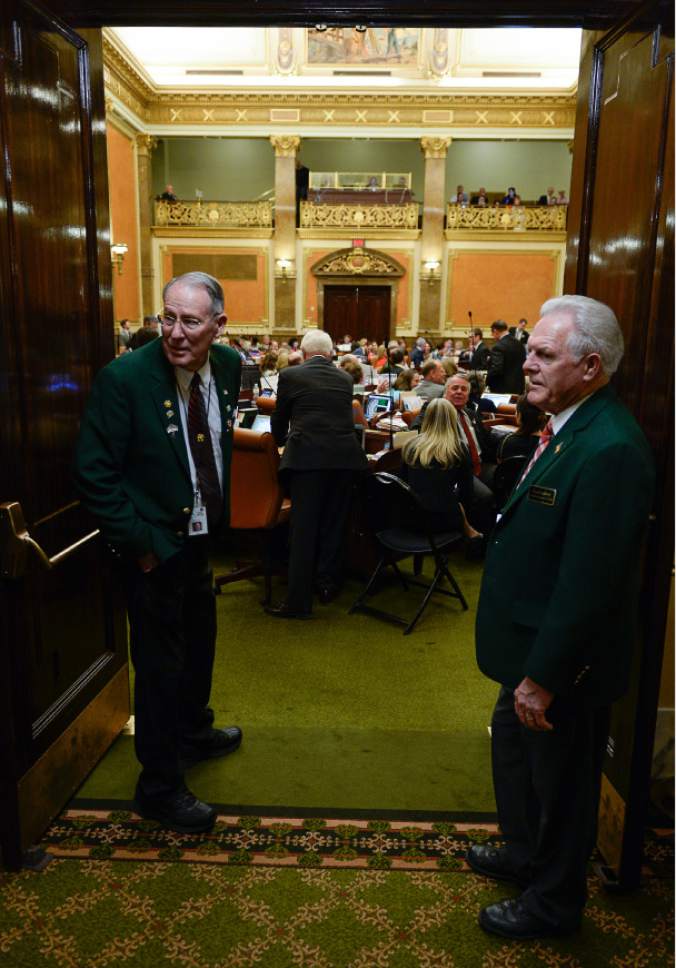This is an archived article that was published on sltrib.com in 2016, and information in the article may be outdated. It is provided only for personal research purposes and may not be reprinted.
Mention the supermajority in the Utah Legislature, and most people think of the 86-18 majority that Republicans will hold overall in the House and Senate next year.
But an even larger supermajority exists: the number of Mormon lawmakers compared to those of other faiths.
Mormons will hold a 91-12 edge, according to a first-in-a-generation comprehensive list compiled by The Salt Lake Tribune. (One member, Sen. Daniel Thatcher, R-West Valley City, declined to list his religion, saying, "It doesn't matter").
The newspaper assembled the information from past surveys, listings on election websites, including Project Vote Smart and Ballotpedia, and direct emails and calls to some members.
So 88 percent of Utah legislators — eight of every nine — are members of The Church of Jesus Christ of Latter-day Saints. In comparison, only 63 percent of all Utahns are Mormon, according to a 2014 study. So Latter-day Saints have about a quarter more representation than their population would predict.
The numbers haven't changed since a 1991 survey by the University of Utah Survey Research Center that found that 91 of the 104 lawmakers were active Mormons.
For the incoming Legislature, 11 of the state's 12 non-LDS lawmakers are Democrats. Sen. Ann Millner, R-Ogden, former president of Weber State University and a Baptist, is the only Republican in the upcoming Legislature who is not a Mormon.
That raises many questions about the effect of the lopsided margin in the Capitol. Many lawmakers say it matters little on most issues but that it does influence those in which the LDS Church is perceived to have strong stands such as alcohol, gambling, assisted suicide, immigration and gay rights.
—
Key-issue influence • Sen. Jim Dabakis, D-Salt Lake City, a former Mormon, said church involvement on bills "does happen, but a lot less than a lot of people perceive. In 95 percent of the bills, the LDS Church has no stand, no opinion and doesn't really care."
He added, however, that the faith has enormous power when it chooses to get involved, but it need not do that often because so many Mormons hold the same view on key issues.
"I find a lot of my colleagues perceive that their church would act this way, and therefore they would need to act this way," Dabakis said. "I think that, from my perspective, is where a lot of problems come in," because assumptions about the religion's stance may be incorrect.
An example, he says, is legislation last year to ban housing and job discrimination against lesbian, gay, bisexual and transgender people. Dabakis, who is gay, says most Mormons figured their church opposed it, so such bills never went far in past years.
When Dabakis and others decided to make a major push for the legislation, "the meetings were with the LDS Church. They were not with the Legislature until after Elder [L. Tom] Perry and I had pretty much decided that there would be a bill." Perry was, until his death last year, an apostle and one of the top leaders of the 15.6 million-member global religion.
When the LDS Church formally backed the legislation, it passed easily.
"On those touchstone issues," Dabakis said, "you're beating your head against the wall if you think you can change things without first sitting down with the church and coming to an understanding."
During this year's legislative session, the Mormon church issued a statement opposing any change to gay-rights laws — including urging no action on a proposal to toughen hate-crimes measures. The LDS statement said any such changes could throw off "the balance" achieved in the previous year's LGBT anti-discrimination compromise. The hate-crimes legislation, along with bills styled as religious-liberty protection measures opposed by the LGBT community, all fell by the wayside.
Rep. Rebecca Chavez-Houck, D-Salt Lake City, an Episcopalian, said she thought she had a chance with a bill to allow assisted suicide for the terminally ill until the predominant faith recently came out with stronger stands against it because of similar movements in California and Colorado.
"A couple of years ago I may have had more wiggle room in chatting with my colleagues who are LDS," she said. "It's just very clear that their faith tradition opposes this, so it affects their personal stance."
She sees only long-shot odds of passing such a bill now, even though polls have indicated most Utahns support the concept.
A popular proposal to legalize medical marijuana was also stopped dead in its tracks in the past session because of LDS Church opposition, although some lawmakers are exploring returning with a much watered-down plan.
"Every legislator comes to [Capitol] Hill bringing their own values," said Rep. Patrice Arent, D-Millcreek, the lone Jewish member of the Legislature. "Some are more impacted by their religion than others, even in the same religion. But I have seen situations where there have been positions of the LDS Church that were not accepted by my colleagues."
She said an example was in some anti-abortion legislation in which exceptions to allow abortion did not match the church's position and were actually tougher.
And Mormon leaders spoke in favor of stronger gun-control laws in the wake of the 1999 Columbine High School shootings in Colorado, but lawmakers refused to take action despite a push by then-Gov. Mike Leavitt.
Senate President Wayne Niederhauser, R-Sandy, who is LDS, said, with so many Mormons in the Legislature, "it would be naive to say there isn't some kind of influence there."
For example, House Minority Leader Brian King, D-Salt Lake City, who also is Mormon, said, "The fact that you are not likely to see serious attempts to bring any gambling to the state of Utah is obviously influenced to some degree by the LDS Church."
Utah and Hawaii are the only U.S. states with no legalized gambling, and Utahns are a prime customer base for the state-line casino towns of West Wendover, Nev., and Mesquite, Nev., and the lottery ticket outlets in southern Idaho.
—
Pressure? • Direct LDS influence is still less than many people imagine, says Niederhauser, adding that non-Mormons are not excluded from the legislative process. "Mormons are taught to be inclusive. Whether they are or not, they are taught to be. I think we try to bring all views into discussion."
He cites his personal experience: "I've never had the church or any of their lobbyists tell me how to vote. You don't feel that kind of pressure."
Others disagree.
Former GOP Rep. Carl Wimmer, who left the LDS Church to become an evangelical Christian, created a stir last year with a blog accusing the LDS Church of bullying Mormon lawmakers on illegal immigration and alcohol.
He said he had his own LDS leader call to lobby him after receiving calls from higher-ups. Church lobbyists joined with House leaders to tell a colleague that when an immigrant worker bill came up, "He was to support the bill, period," Wimmer said.
Some legislators at the time backed Wimmer's assertions about heavy-handed church lobbying. Others said they have never seen anything like what he described.
"As the church has asserted before," LDS Church spokesman Eric Hawkins said at the time, "elected officials who are Latter-day Saints make their own decisions and may not necessarily be in agreement with one another or even with a publicly stated church position."
He added, "The church actively engages in the political process on a handful of issues — particularly when legislation involves moral issues or impacts the doctrines or practices of the church. Recent positions on immigration and religious freedom are good examples. In such instances, church lobbyists may interface directly with political leaders to represent the church's views."
On immigration, the Legislature and Gov. Gary Herbert (who also is LDS) rejected a strong push five years ago by the conservative wing of the GOP to adopt Arizona-style laws allowing police to stop and check the papers of anyone suspected of being undocumented. Instead, with encouragement of the Mormon church, they approved a state guest-worker law (which never received required federal waivers) and other immigrant-friendly policies.
Dabakis said he saw a case of direct but behind-the-scenes LDS involvement earlier this year when he ran a bill seeking to eliminate "Zion Curtains," the 7-foot-high barriers to block children from seeing alcoholic drinks mixed in new restaurants.
"It was made clear to me that I could have a hearing, but nothing's going to happen, that legislative leaders have met with the LDS Church and we — meaning they — have decided that nothing will happen on the Zion Curtain. Maybe it will happen next year. That was that," he said.
"There was no public discussion of it. It was decided when the church sat down with legislative leaders of the Republican Party," Dabakis added. "Occasionally that does happen, but a lot less than people perceive."
Two years earlier, the Mormon church caused a stir when, days before the start of the annual legislative session, it released a video of apostle D. Todd Christofferson urging no change to Utah's liquor laws. No alcohol-related bills were given serious consideration by lawmakers.
—
Mormon-made laws? • Dabakis criticizes one side effect of the LDS supermajority when Republicans have only one non-LDS member.
"Let's face it, laws are made behind those closed caucus doors. If there's a debate, that's where it occurs," noting that the Senate Republican Caucus is always closed and House GOP Caucus meetings often will close to discuss controversial issues — including big ones such as Medicaid expansion.
"So all of those Utah laws are made by all Mormons, except for Senator Millner," he said. "That's a big responsibility."
The LDS supermajority raises questions about why Mormons have that big margin, and why most non-Mormons in the Capitol happen to be Democrats.
Sen. Karen Mayne, D-West Valley City, a Methodist, said the supermajority itself probably is simply because "the majority of the people in the state are LDS," and so that group generates more candidates.
King said Mormons may receive extra support because of a common belief in Utah that someone cannot be a good Mormon without also being a Republican.
"It's harder than ever to believe that in light of Donald Trump being the standard-bearer for today's Republican Party," he said. "He embodies so much of what we teach our children not to do."
Similarly, Dabakis said, "In a lot of quarters in Utah, it's like you don't drink, you go to sacrament meeting and you are a Republican. It's all part of the same checklist."
Niederhauser said Utah switched from a Democratic state in the 1960s to a heavily Republican one now largely because Mormons believed the Republican Party more closely represented their views on moral issues such as abortion. "That was quite a factor."
—
Democratic gap • Why 11 of the 12 non-LDS legislators are Democrats prompts some interesting theories.
Rep. Angela Romero, D-Salt Lake City, a Catholic, said it may be in part that all the Democrats in the Legislature come from Salt Lake County, where Mormons comprise only 51 percent of the population. Democrats also hold seats in areas that tend to be more ethnically and culturally diverse.
"So you have many religions" in those areas, Romero said. "It may just be the demographics of those areas."
Chavez-Houck said the Democratic Party also actively recruits candidates among minority populations, which tend to include more non-Mormons. "We try to reflect the diversity of the community" by recruiting minorities, she said. "We're not as intentional about the religious diversity. I think it just happens."
Several legislators said non-Mormons do not face any real disadvantage for election or in making laws.
"I have never been asked my religion by any of my colleagues," Mayne said, "and I have never been asked my religion by any of my constituents."
Arent said when she first ran for office, "I was told by some people that I would not have a chance because I was not LDS. People did ask about my religion. It was not like I kept it a secret. But I don't think it impacted the results."
Millner, the one GOP non-Mormon in the Legislature, says she has faced no disadvantages. She was also the first non-Mormon president of Weber State University. But like her LDS predecessors, she said she was often invited by members of the faith's governing First Presidency to speak at regional conferences in the Ogden area.
"I've always worked well with both LDS and non-LDS [people]. My goal in the Senate is to represent all my constituents," Millner said. "I think that's what everyone tries to do."
Minority in the LDS legislative supermajority
Nearly 9 in 10 (88 percent) of incoming Utah legislators say they are LDS. Following are the others:
Senate Democrats (all from Salt Lake County) • Jim Dabakis (nonaffiliated), Jani Iwamoto (Japanese Church of Christ), Karen Mayne (Methodist).
Senate Republicans • Ann Millner of Ogden (Washington Heights Church, Baptist).
House Democrats (all from Salt Lake County) • Patrice Arent (Jewish), Rebecca Chavez-Houck (Episcopalian), Lynn Hemingway (Methodist), Sandra Hollins (Baptist), Karen Kwan (nondenominational), Angela Romero (Catholic), Elizabeth Weight (Unitarian), Mark Wheatley (Catholic).
Note • Sen. Daniel Thatcher, R-West Valley City, declined to list a church preference.
Sources: Salt Lake Tribune analysis of past member surveys, listings on election websites, including Project Vote Smart and Ballotpedia, and direct emails to some members.







